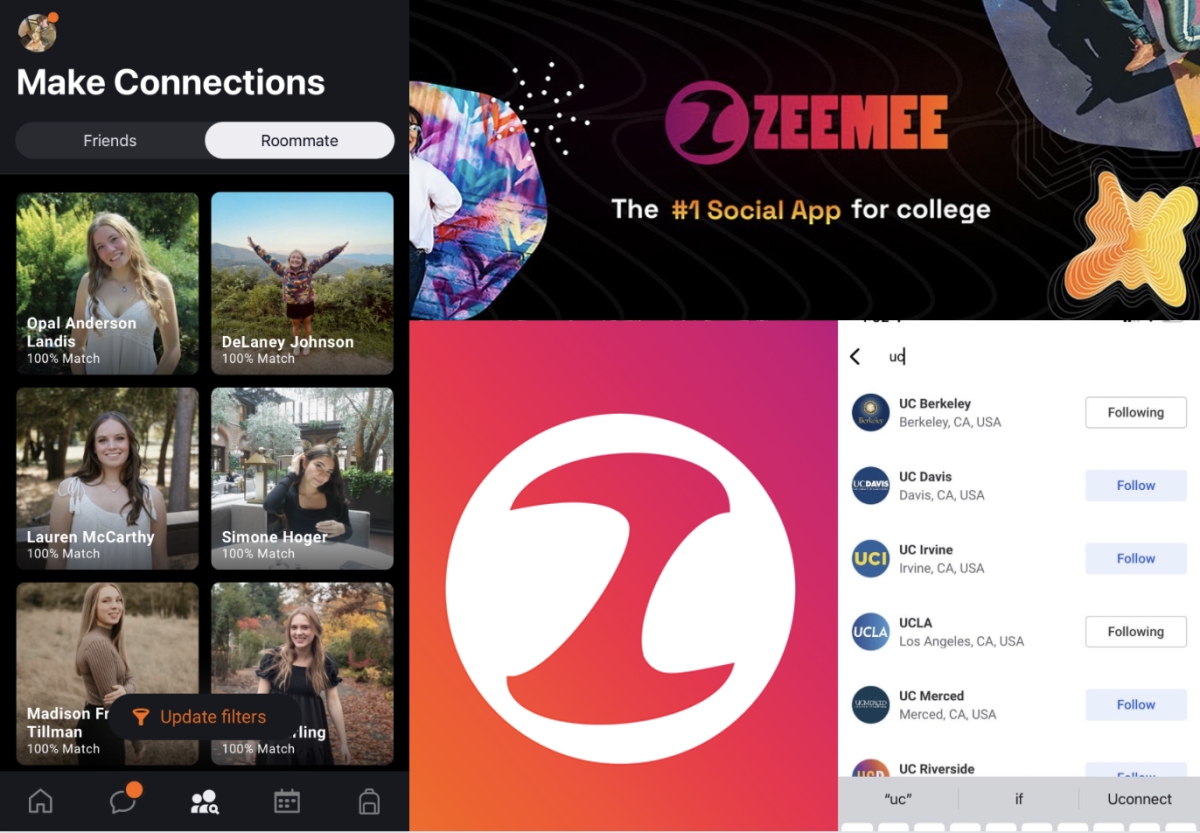By the last week of October, I had wiped my hands clean of all things college. Essays were finished, extracurriculars logged, and applications were in. Come December, clustered among hundreds of ongoing college recruitment emails, I received an invite from each of my prospective schools to join their ZeeMee channel for accepted students.
Quick question: What in the world is ZeeMee?
Largely inspired by other social media apps, ZeeMee is a college community building app curated with the new generation of college students in mind. The app is largely community focused, giving students many opportunities to connect with like-minded peers and find a potential roommate. Over 200 colleges and universities have partnered with ZeeMee, hoping to give students a fun and informative platform to explore their options for their future, in addition to providing colleges a unique way to assess prospective students.
The founder of ZeeMee, Adam Metcalf, stated in an interview that the app’s creation was heavily influenced by the statistic that nearly 90% of Gen Z individuals find it important that they have good friends before arriving on campus. The strong social focus of the app allows people to connect with others planning on attending the same school through a private messaging service and various chatrooms. You could enter a prospective student chat through an invite from each school, but there were also more exclusive channels for those who had been admitted (it was required to provide proof of admission to enter), and those who had committed. Each channel has a series of admin to oversee conversations and answer questions. These individuals largely consist of current students or admissions counselors.
From my initial download of the app I came to a few crucial conclusions. There was no tangible way I could keep my notifications on, there were more thirst traps and faceless pictures than photos actually indicative of character and people were doing far too much. As overwhelmed as I was, the app was generally very easy to navigate. I created a profile and began answering a series of public questions that ranged from what my favorite food was to my sleeping habits. There had to have been at least forty questions to choose from, but I opted for about five and made my way to the roommate selection page.
There is no more accurate way to describe it than to compare it with Tinder. The screen in front of me consisted of hundreds of profiles to explore, ranked by what percentage of a match each individual was for me based on my preferences. There were several filters you could apply depending on what you have in common, ranging from specific college acceptances, majors, home states and gender.
While it can be helpful to have so many specific filters to aid your search for someone to live with during your first year away from home, is it really reasonable to cast judgment so quickly? Several students on ZeeMee have expressed a dislike for the harsh nature of the roommate selection process, as it plays directly into the idea that you can judge someone’s character based solely on their appearance and answers to a few basic questions.
“You only see their profile and then you don’t get to know who the person actually is. So I think it’s kind of mean, you know? Like you look at this person at face value and you say, ‘Oh, I don’t like this,’” explained Summit senior Eleni Adams.
Adams shared that the college she’s committed to, University of St. Andrews, prohibits getting to know your roommate before moving in, which greatly limits opportunities to connect before classes begin. Regardless, she’s confident that she’ll be able to make connections in the fall.
“It’s not really a big deal for me. I feel like I’m a pretty outgoing person, and the college experience is all about going out on your own and meeting new people and trying to find yourself in a different setting,” said Adams.
This sentiment, which directly contrasts Metcalf’s inspiration for ZeeMee, was echoed by Summit senior Hayden Gullickson, whom despite being a self-proclaimed introvert, wouldn’t consider social apps like ZeeMee to be a necessity for making connections with peers.
“I don’t think it’s important to establish connections before college, I think you should connect once you’re there,” explained Gullickson. “I’ve heard of more good stories about [being assigned] random roommates than bad ones, and now they do it based on certain interests and stuff like that anyways.”
Students seemed less concerned about the shiny new tool for finding roommates than about how this app may change applicants’ relationships with colleges. If we’re so quick to judge each other based on a thirty second profile review, what should we expect from colleges that review the same content?
With the creation of ZeeMee came the option for students to include their profile in college applications. This now allows individuals to express themselves in media separate from their college essays or list of extracurriculars, adding depth to their applications.
These profiles include a photo, personalized bio, intended major(s), extracurriculars, and a handful of questions that allow you to get to know the applicant on a more personal level.
“I don’t like that a college would use a social media platform as an influence on my decision,” Gullickson. “If colleges keep using a social media presence [college acceptance] might turn it into a social battle as well as an academic one.”
Suddenly, your 4.0 may be one-upped by an applicant with the perfect profile picture, or your dedication to your extracurriculars could become lost in the shadows of another individual’s extensive Q&A section in their ZeeMee profile. I was barely able to handle writing an essay of substance while applying, forget attempting to pick a flawless photo for admissions counselors to review as well. The thought of losing a battle for acceptance because another candidate had a more radiant smile than me genuinely makes me sick.
As more institutions begin utilizing ZeeMee in the application process, partnered universities will need to be careful not to judge applicants too heavily on their profiles. Adams elaborated that if used the right way, ZeeMee could be a valuable tool to promote safety and community on campuses.
“Universities want to know who the student is that they’re accepting into their college,” said Adams. “If this app is going to say anything about their character, their beliefs, things like that, and help [the college] make sure that the applicant will maintain a safe environment for everyone, then I think it’s a good idea.”
































